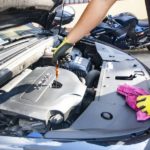Quick Navigation
It is not uncommon to hear grinding, squealing, or scraping noise when applying brakes or turning a corner. This problem is associated with old vehicles and can also be heard in new ones.
These noises can be caused by factors that prevent the brake dust shield from performing its duties properly. As such, the noise will seem to be coming from the brake dust shield.

The brake dust shield noise can ruin our moods. Therefore, finding the best solution should be your priority whenever you hear it.
So, let’s discuss the various causes of this noise and how you can solve them.
1. Bent Dust Shield
Since the noise comes from the brake dust shield, it implies that this component is faulty or that its members have a problem. But how can a dust shield gets faulty?
Many ways can make the brake dust shield not perform its functions, including; preventing dust, debris, or water from getting into the braking system.
One way the brake dust shield can get faulty is by bending. Since this component is made of fragile materials, it can bend over time.
A bent dust shield will make noise every time it rubs against the rotor. It usually occurs when you apply the brakes or when the car turns a corner.
To fix this issue, you will have to bend back the dust shield to its original shape. That is, to a point where it is no longer touching the rotor every time you apply the brakes.
2. Rusted Dust Shield
The second way the brake dust shield gets faulty is by developing rust over time. It happens when it gets exposed to water now and then.
This rust will make the dust shield peel off every time you apply brakes. The peeled-off metals will hit on the rotor and produce a thumping noise.
It is impossible to fix a rusted dust shield; hence the only way you can correct the brake dust shield noise is by installing a new one.
3. Loose Dust Shield
It is another way in which the brake dust shield can get faulty. It happens when you are used to driving your car on harsh terrains.
The loose dust shields will touch the rotors and other components close to it when you apply brakes. It will make your vehicle produce noise that disappears when you let go of the brakes.
The brake dust shields are usually held to the braking system by bolts; hence you should tighten them to get rid of the noise.
4. Loose Rotors
Rotors are essential components that supply energy to the wheels. Therefore, they need to move freely and in one direction.
However, the nuts that hold these rotors to the vehicle can become loose due to reasons such as regularly driving your car on harsh terrains, hitting the brakes while driving at high speed or when their nuts get old.
When this happens, the rotors will scrap the brake noise shield every time you hit the brakes or turn the car, resulting in noise production.

This issue may sound scary and even drives your mind to a situation where you had to spend vast sums of money repairing the car.
But you don’t have to be since you can quickly fix it by tightening the nuts that hold the rotors. You only have to know how to remove the wheel and where the rotors are located in the braking system.
Also, you have to understand what is meant by loose rotators since it doesn’t mean that the rotators are rotating but that they are moving sideways whenever you hit the brakes.
5. Massive Rust Or Mud On The Rotors
The rotors have been designed to move freely. However, when exposed to water, it accumulates rust on its surface.
Also, driving your car in a muddy area can make the mud get attached to the rotors.
The rust or mud will reduce the spacing between the rotors and the brake dust shield; hence the rotors will scrap the brake dust shield every time you make sideway turns.
It will make the car produce a strange sound coming from the braking system.
To solve this problem, get a piece of metal and scrape off the rust or mud. The mud will easily peel off, but the rust might not; hence you will have to buy a new rotor.
6. Presence Of Rocks Between The Brake Dust Shield And The Rotor
Do you use your car on a road that has gravel? Have you driven it on a rocky surface one of these days?
If so, then the noise might have to do with the particles that came into contact with the brake dust shield.
An issue does not necessarily cause the brake dust shield noise with the dust shield or other components, but sometimes it is caused by rocks locked between the dust shield and the rotor.
As the brake pads squeeze on the rotors, they crush the rocks in such a way that produces a screeching sound.
You can use air pressure to push the rocks outside to correct this problem. But before doing this, you have to remove the affected wheel, disengage the brake cables, and remove the caliper.
You can also use your hands to extract them when it’s big. It is not easy; hence, you might need a mechanic to sort out the issue.
7. Expanded Brake Dust Shield
The brake dust shield noise may also be due to the expanded dust shield. As much as it sounds crazy, the braking system incurs a lot of friction, resulting in a lot of heat.
Since the brake dust shield is made of aluminum which tends to expand fast, it reaches a time when it will touch the rotors. It happens mostly when braking since much expansion takes place at this time.
After assessing the other areas responsible for this noise, this conclusion is often reached after finding no fault.
You can solve it by cleaning the brake shield to ensure the free flow of air into the braking system and sufficient cooling in the spaces between the shield and the rotors.
If you have driven your car over a long distance and suddenly heard this noise, it would be best to stop the car and let it cool off for some time.
If the problem was due to the expansion of the brake shield, then you will notice that the noise will disappear after allowing the car to cool off.
Conclusion
The brake dust shield noise can be irritating. It can also cause stress since it gives you the impression that money is needed to fix it.
However, by understanding its significant causes, you will be able to fix it whenever you hear it while incurring little to no expenses. You should be aware that there are many causes of this noise.
They include bent brake dust shield, loose brake dust shield, loose rotors, rocks in the braking system, etc. It would help if you thus made an effort to grasp how each one causes the noise and how you can fix them.

Patrick started his love affair with cars in his childhood. Over the years, he claims a sturdy hold on his driving skills, along with a thorough understanding of cars. We can expect some interesting, holistic, and pleasurable blogs with his flair for writing and his love for cars.
Being a car enthusiast, Patrick has experience comprising of two decades in which he has ridden some of the meanest and strongest machines in the automotive industry. His previous avatars include an automotive professional, photographer, and journalist, and you will certainly experience the roundness of experience in his piece on this site.
In his second decade of reviewing cars and analyzing tools, Patrick is all set to give you convincing, reliable, and the latest information regarding what’s happening in the automotive industry. Currently, he owns a BMW Z3 but cannot get his eyes off Aston Martin DB5. He is a car enthusiast; he loves cooking and listening to music, especially jazz. Here are some of the pieces written by our ace author.






